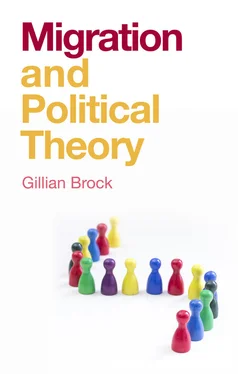Chapter 5covers responsibilities concerning legal immigrants and their host states. What responsibilities do legal immigrants have to their new home states? What responsibilities do states have to these new members? States have responsibilities to maintain an ethos of inclusion, so working out how and when to accommodate difference is therefore important. The chapter begins by noting that there are several models of membership, including those aimed at assimilation, integration, and inclusion, that have influenced state policies over the last one hundred years. We see how contemporary trends have moved away from assimilation towards models of integration. The chapter covers several key concerns about how to promote integration. We start with the debate between Will Kymlicka and his critics concerning migrants’ rights and responsibilities in multicultural environments. While states should aim to offer an inclusive and welcoming environment to new members, there seem to be multiple ways of enacting these goals, with some presenting as better ways to achieve the desired objectives. The chapter draws on many contemporary examples to illustrate salient issues, from prohibiting certain practices (such as banning the wearing of hijabs or headscarves) to practices that actively encourage new migrants to celebrate the cultures of their home countries.
While Kymlicka’s model emphasizes group-differentiated rights, other models, such as those of Joseph Carens, stress many of the informal behaviors, norms, and practices that are central to integration. Mutual adaptation is frequently required between host and immigrant citizens. This chapter also considers the underlying question of how to promote a flourishing democracy in multicultural environments, the role that national identity might play in such projects, and the mechanisms that governments may permissibly use in promoting democratic values.
Chapter 6discusses the rights and responsibilities concerning undocumented migrants and their host states. Do so-called illegal migrants deserve fair treatment and, if so, what does this consist in? Should their children be entitled to free education in a state, even when parents have no legal residence permission? Should undocumented residents have access to certain services or opportunities, such as being permitted to obtain a driving license? And for those who have resided in a country illegally for a reasonably long period, such as a decade or more, should they eventually have access to legal residency or citizenship processes? Critics of regularization policies argue that such actions would reward illegal behavior and are unfair to those law-abiding applicants who have been patiently waiting for admission while remaining in their countries of origin. By contrast, those who defend such policies often maintain that such actions are most consistent with justice as they recognize the role of social belonging: such long-term residents are members of the communities they have joined and are, after sufficient time has passed, entitled to full rights as members of those communities. The case is particularly poignant for those who arrived illegally as very young children and who know no other place as home, such as many of the Dreamers in the United States. Denying access to regularization for such residents seems to punish the innocent harshly for features of their existence beyond their control. While the strengths and weaknesses of such arguments are reviewed, this chapter also highlights why the most compelling of these arguments point in favor of some important rights for long-settled undocumented migrants. Objections to programs of regularizing the status for such long-settled migrants can often be addressed through a restorative approach in which the undocumented can reasonably be said to have earned citizenship or made amends for past transgressions.
Chapter 7looks at fair treatment in relation to temporary migrants. Much migration is temporary and involves mutually beneficial economic arrangements for sending and destination countries. The scale of such movement is vast and some regions of the world are highly dependent on large temporary workforces. The migrants themselves frequently welcome such opportunities as much-valued employment, especially in home countries with large unemployment problems. Many of these migrants have no desire to settle away from home countries and view these rather as good opportunities to save and remit funds to family.
Are there normative constraints on how destination countries may treat their “guest workers” and, if so, what are they? For instance, may employers treat them in much worse ways than employees who are citizens? Are destination countries obliged to offer citizenship to those who have been working legally within a state for a long period of time, as Michael Walzer (1983) argued? This chapter considers how temporary migrants may and may not permissibly be treated in host states, consistent with the demands of justice. We also examine the arguments of those who believe all temporary work programs are morally objectionable and should be abandoned. Here a key factor is whether there are ways to strengthen the protections that temporary workers receive so that they are not exploitative in the ways critics fear.
Chapter 8looks at justice in out-migration. Are there ever circumstances in which governments may regulate or restrict citizens in leaving a country? The issue of restricting exit has risen to prominence through several recent developments. During the early stages of the coronavirus pandemic of 2020, China prohibited the out-migration of millions of its own citizens, along with many other travelers. In 2015, governments of several western democracies sought to prevent the departure of some of their citizens hoping to travel abroad to join the struggle for an Islamic State and other terrorist organizations. States have obligations to prevent harm to citizens so, on these grounds, there appears to be support for such actions. However, what weight should be placed on the human right we apparently all have to emigrate? The chapter reviews the international framework for navigating such issues so we can appreciate that considerable guidance is available. The chapter focuses on one dominant contemporary example in which the issues have recently been explored by many leading political theorists, namely the issues arising over “brain drain.” Where brain drain is an issue, migration can result in significant harms for those who are left behind in countries of origin when high levels of skilled migrants leave a country, increasing deprivation for the worst off. How, if at all, should this issue of brain drain affect migration policy in destination or sending countries? For instance, some argue that policies that mitigate losses that migrants would otherwise create can be justified in such circumstances. Examples might include conditioning departure on completion of short compulsory service terms or commitments to pay taxes to countries of origin for a limited time. Such policies suggest that justice requires regulating exit under certain conditions. I cover these issues in chapter 8.
Chapter 9considers where debates in this field are going, identifying some emerging issues and future directions for continuing migration discussions. In addition, this chapter considers important challenges to debates as they have unfolded so far. Core issues tackled include just enforcement methods, permissible forms of resistance to unjust immigration policies, and the role cities should play in immigration matters. I also look at some arguments from the field of critical border studies that challenge dominant assumptions about how to approach migration matters and I discuss the implications of the Covid-19 pandemic on migration and political theorizing. Next, I briefly explain some of these topics further.
Читать дальше












